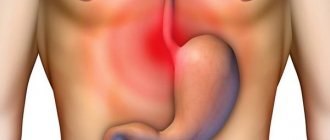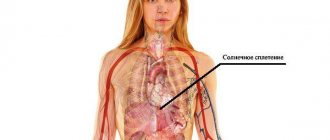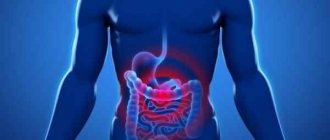Painful sensations in one organ periodically radiate to another. “The stomach and heart hurt” are often said by people with ordinary gastritis. This is a typical situation in an internal medicine clinic. The causes of stomach pain are varied, but they rarely affect the cardiovascular system. Confusion occurs due to the close anatomical location of both organs. Therefore, high-quality differential diagnosis and timely treatment provide a good result and the absence of complications.
Gastritis
Often the disease causes pain in the heart, especially during physical activity and bending to the sides. An attack can be triggered by eating food, especially salty, spicy or fatty foods. A state of hunger also provokes an attack. Often the sensations frighten the patient with their localization, but upon examination it turns out that there are no problems in the field of cardiology. The malaise is accompanied by symptoms:
- Feeling of heaviness after eating.
- The patient is feeling sick.
- Vomit.
- Stomach is bloated.
- Diarrhea, often followed by constipation.
- Loss of appetite.
Ignoring these symptoms leads to severe weight loss, which is recognized as a side sign of gastritis.
Diet food
Pathology of the gastrointestinal tract, gall bladder, and heart requires mandatory adherence to a diet. The basic principles of nutrition are:
- Fractional meals. The number of receptions is 5-6 per day.
- Eating food warm.
- Exclusion of fatty, spicy, smoked, salty foods.
- Steaming dishes.
- Replacing fresh bread with yesterday's bread, crackers.
- Exception of chocolate and baked goods.
- Inclusion of sweet fruits and vegetables in the diet.
It is necessary to give up smoking, alcoholic beverages, coffee, strong tea, and soda.
Walking in the fresh air, following a daily routine and healthy sleep, which should last at least 8 hours, will help maintain health.
Pain in the heart and pain in the abdomen can have a common localization, so it is extremely difficult to find its source. This problem should be addressed by the attending physician. It is enough for the patient to remember the disturbing symptoms and their severity in order to tell a specialist about it. It is unacceptable to try to relieve pain on your own, since its exact causative factor is unknown. The medications taken can only aggravate the condition and cause adverse reactions.
Ulcer
A stomach ulcer is often a consequence of advanced gastritis. One of the first signs is tingling in the heart area, especially after eating. The heart organ is located close to the stomach, and is involved in the inflammatory process and reacts with pain. Symptoms occur immediately after eating.
Accompanying symptoms:
- Frequent heartburn.
- Increased stomach acidity and frequent constipation.
- A feeling of discomfort in the stomach, which leads to increased excitability.
- Manifestation of belching.
Pancreatitis
With an inflammatory process in the pancreas, it is not always clear what hurts more – the stomach or the heart. When feeling unwell, the pain radiates to the heart and is localized not only in the peritoneum, but also in the chest area, especially on the left side. Sensations in the heart area arise suddenly, they can be dull, aching, sharp, sharp, and have different types of progression. This is what distinguishes the nature of the manifestations from cardiological ones. With heart disease, the pain is acute and increases every time. If treatment is delayed, the pancreas will gradually be completely destroyed, which will lead to intoxication of other organs. Possible death.
Symptoms:
- Pain in the region of the heart and hypochondrium.
- Nausea and vomiting.
- Abdominal pain.
- Intestinal disorders. Undigested food remains are found in the stool.
- Increased body temperature.
- High blood pressure.
- Pale skin.
- Belching.
Attention! Most often, excessive alcohol consumption leads to the disease and exacerbation.
What are the signs of heart pain?
Photo: : Kaspars Grinvalds/Shutterstock.com
Firstly, this is localization . Most often this is pain behind the sternum or in the left side of the chest. The pain may radiate to the left arm, between the shoulder blades, or to the lower jaw. Secondly, the characteristics of pain . In the classic version, it is a pressing, squeezing, baking or dagger pain.
The next important point is that angina most often has provoking factors - physical or emotional stress. This means that there is no pain at rest, but during physical or emotional stress they appear. With a critical narrowing of the vessel supplying the heart muscle, angina pectoris can occur with minimal exertion at rest and even at night.
When assessing the origin of chest pain, the time factor . True heart pain is not long-lasting; minutes count. In other words, the heart cannot “ache, pull, prick” for several hours, days, or day after day. Such pain is often a manifestation of pathology in the musculoskeletal system. However, true heart pain lasting more than 20 minutes indicates the possible development of a serious complication - myocardial infarction.
It is worth paying attention to the circumstances under which the pain goes away. Angina stops on its own within about a few minutes, for example, if the patient stops or calms down. Some patients benefit from nitroglycerin, which reduces or completely relieves angina pain within 1-2 minutes. If a person has developed a myocardial infarction, then the chest pain will not be relieved and will not go away after taking nitroglycerin; in this case, emergency help is needed.
With angina pectoris, a temporary disturbance of blood flow occurs in the coronary artery affected by atherosclerotic plaque. Taking nitroglycerin allows you to expand the lumen of the vessel, improve blood flow and thereby the pain will go away, which leads to pain regression. During a heart attack, the narrowing of the lumen is so pronounced that it leads to irreversible damage to the heart muscle. In this situation, the pain has another cause and taking nitroglycerin will no longer have an effect.
In addition to the classic characteristics, angina pectoris can have so-called atypical forms, including manifestations in the form of shortness of breath or abdominal pain.
Thus, we see that heart pain, on the one hand, in most cases can be easily recognized, but on the other hand, it is not always so easily recognizable. That is why it is important that if you have pain in the chest or feel short of air, you should immediately consult a doctor.
Cholelithiasis
The normal functioning of the gallbladder with the above-mentioned ailment is impaired. This leads to inflammatory processes in other organs, resulting in intoxication of the whole organism. With pathology, the area of the sternum and heart tingles.
The symptom is accompanied by signs:
- Severe pain in the region of the heart, under the heart, then extends to the sternum and abdominal cavity.
- Cardiopalmus.
- Vomiting with bile and at the same time pieces of food.
- In an acute form, pain in the stomach can radiate to the liver area.
The symptoms of cholelithiasis are similar to those of a heart attack! Medical diagnosis is required.
Diaphragmatic hernia
A disease such as a diaphragmatic hernia of the esophagus often provokes pain localized in the upper part of the chest, on the left. The disease is often confused with angina pectoris. Along with heart sensations, other symptoms also appear:
- Difficulty swallowing.
- Heartburn in the acute stage.
- Frequent belching with a bitter taste.
- Nausea after eating. Vomiting is common.
If other diseases are characterized by dull sensations in the heart area, with a diaphragmatic hernia there is stabbing pain, for example, in the abdomen and chest. The sensations intensify when you are in a horizontal position. Often the disease occurs in old age or when you are overweight.
What examinations are needed to confirm or refute the diagnosis?
When it comes to heart disease, an important test is a resting electrocardiogram (ECG). In many diseases, the ECG changes, but in the presence of angina in a patient at rest without pain, the ECG may be completely normal. This means that the ECG data will be within normal limits, and the patient will feel angina. Thus, if you suspect angina pectoris, you cannot limit yourself to just performing a resting ECG.
An important stage of examination in determining the genesis of chest pain is a stress test. The most commonly used combination of exercise (treadmill or bicycle) in combination with ECG recording. Changes in the ECG during exercise and complaints from the patient with a high degree of probability allow us to judge the presence or absence of angina. If there are associated complaints, for example, interruptions in heart function, the doctor may prescribe daily ECG monitoring. It will allow you to record rhythm disturbances, if any. And in some cases, heart rhythm disturbances may indicate a problem in the blood supply to the heart muscle.
In addition, cardiovascular risk factors are assessed: age, sex of the patient, heredity, blood pressure level, the presence of certain diseases, as well as a number of blood parameters, the increase of which is associated with an increased risk of angina pectoris (blood lipids, glucose, creatinine).
There are typical manifestations of heart pain, but the disease can also be atypical. That is why doctors do not recommend self-medication, but rather trust qualified specialists. If you have chest pain that you have not previously experienced, make an appointment and discuss it with your doctor. It is quite possible that already at the initial consultation the doctor will tell you that there is no threat from the heart. But it is quite possible that a more complete examination may be required. It is important to consult a doctor in a timely manner. And the doctor will assess the symptoms, risks, conduct the necessary examinations and, if necessary, develop a treatment plan or a plan of preventive measures together with the patient, so that the patient lives as long as possible and the quality of life is not affected.
Cholecystitis
A disease characterized by inflammation of the gallbladder, often accompanied by heart disease. Initially, the pain syndrome is localized in the stomach area. If the symptoms remain unattended, the disease enters the acute stage and spreads from the stomach to neighboring organs, especially those located behind the sternum: heart, lungs, bronchi. The pain is often dull, aching in nature, accompanied by other symptoms.
Symptoms:
- Cardiopalmus.
- Belching with a bitter taste.
- Frequent vomiting.
- Changing diarrhea to constipation and vice versa.
- Itching of the skin.
Inflammatory process of the gallbladder
Timely treatment eliminates unpleasant sensations once and for all. In advanced forms, the heart and stomach constantly hurt. An attack occurs at any time.
A lot of stomach diseases can radiate to the heart and be perceived as a cardiac ailment. To understand the situation and know how to help with pain, you need to consult a specialist who can determine the diagnosis and establish appropriate treatment. Then, when similar symptoms recur, a person will learn how to competently help himself without harming himself.
How can you help with simultaneous stomach and heart pain?
Of course, help should be not only symptomatic, but also pathogenetic.
Therefore, it is necessary to look for the cause of the pain. The choice of drug will depend on this.
So, if there is a history of an ulcer or gastritis, and upon examination the heart is in perfect order, then preference is given to the drugs Almagel, Maalox, De Nol.
No-spa or Drotaverine will help remove spasms. The same drugs can alleviate the condition during exacerbation of pancreatitis and cholecystitis.
With hepatic colic, drugs taken orally are unlikely to help, since periodic vomiting will not allow them to be absorbed in the body.
Therefore, preference is given to antispasmodics administered intramuscularly.
It could be Papaverine or Platiphylline. Holagol drops will bring relief; they are quickly absorbed in the oral cavity and immediately begin to act.
The simplest physiotherapeutic procedure – a heating pad – can help relieve pain. For hepatic colic and cholecystitis, it is filled with crushed ice, and for gastritis and ulcers - with hot water. Apply the cloth wrapped in one layer to the epigastric region.
You should not hold back vomiting if you have eaten a lot the day before; in this case, vomiting will bring proper relief.
A prerequisite is compliance with the diet. Then it will be easier for the body, and the symptoms will be less pronounced.
Basic principles of the diet:
- Fractional meals in small portions, eating at least five times a day;
- Food is mechanically, thermally, and in case of ulcers, chemically gentle;
- Exclusion of fatty, fried, spicy, sour, salty and alcoholic drinks;
- Limit fresh bread, it is better to replace it with crackers or yesterday’s bread;
- It is better to cook dishes steamed or boiled;
- It is better to choose fruits and vegetables that are not sour.
If your heart hurts, and the symptoms are similar to stomach diseases, it is recommended to consult a doctor, since such a problem is difficult to cope with on your own. In any case, this is a reason to adjust your lifestyle.
Source: jeludokbolit.ru
Chest pain can occur under many conditions and is not only a pathology of the cardiac system. Such pain may occur due to spasms of the smooth muscles of the stomach. Does your stomach or heart hurt?
Many people ask this question and not everyone can give themselves an answer to what exactly is bothering them when both their heart and stomach hurt at the same time. General symptoms characteristic of diseases of the digestive system can help identify the true cause.
As a rule, pain from the digestive organs is longer lasting than cardiac pain and has some characteristics.
A specialist will help you deal with this unusual situation and determine treatment options. To do this, you need to go to the hospital and undergo an appropriate examination.











